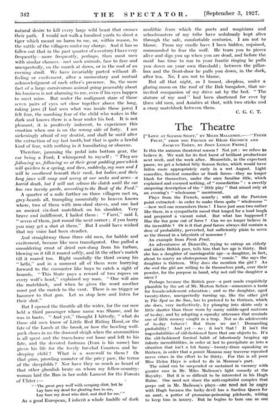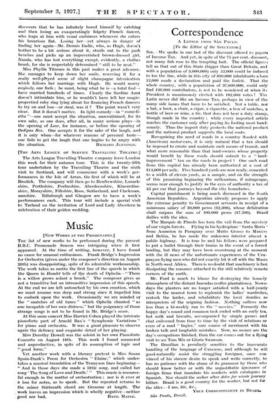The Theatre
["LOVE AT SECOND SIGHT," BY MILES MALLESON.-" FRESH FRUIT," FROM THE FRENCH OF REGIS GIGNOITX AND JACQUES TIIERY, BY JOHN LESLIE FRITH.]
Is this the autumn theatrical season ? Not yet : we refuse to believe it. We wait for its first burst of brilliant productions next week, and the week after. Meanwhile, in the expectant pause, we get a belated Silly Season Series, which would have fallen more appropriately early in a wet August. Light comedies, farcical comedies or frank farces—they no longer blush for themselves, under the once familiar title, which explained and excused nothing, of " eomediettas " : a sweetly simpering description of the little play " that aimed only at an evening's wholesome " merriment.
Plays from the French, usually ; with all the Parisian
point extracted—in order to make them quite " wholesome " —how well one remembers them ! I have just seen two rather like them, in a sympathetic mood that longed for a loud laugh and prepared a vacant mind. But what has happened ? Has the fizz gone out of farce ? Can we no longer believe in the incredible ? Or is it that good farces always did contain a dose of probability, perverted, but sufficiently plain to serve as the thread in a labyrinth of nonsense ?
An example from Fresh Fruit.
An adventuress at Deauville, trying to entrap an elderly
and idiotic British peer, tells him that her age is thirty. But she has a daughter of marriageable age—a daughter, in fact, about to marry an obstreperous film " comic." She says the daughter is thirteen. Why does she mention the girl ? As she and the girl are willing to lie themselves pink, over their powder, for the purpose in hand, why not call the daughter a niece ?
Perhaps because the British peer—a part made exquisitely
plausible by the art of Mr. Morton Selten—announces a taste for female-adolescent education ; and so the daughter, aged twenty-three, unexpectedly turning up, like the other girl in The Spot on the Sun, has to pretend to be thirteen, which she does, very ineffectively, b y plunging into skirts only a little shorter than those worn by many midde-aged matrons of to-day, and by adopting a squeaky utterance that reminds one of little mousey caught in a trap. Not so do adolescents of to-day behave ! But there we are ! Demanding probability ! And yet — no ; it isn't that ! It isn't the improbabilities of old-fashioned farce that one objects to. It's the old-fashioned farcical habit of laboriously heaping up infinite incredibilities, in order at last to precipitate us into a situation that isn't a bit funny—twenty-three squeaking as thirteen, in order that a passee Mamma may traverse repeated nerve crises in the effort to be thirty. For this is all poor Miss Helen Haye is asked to do in MaMma's part.
The mind can be suspended or sustained in vacancy with
greater case in Mr. Miles Malleson's light comedy at the Royalty. But it is so difficult to be interested in his Hugh Raine. One need not share the anti-capitalist complex that peeps out in Mr. Malleson's plays—one need not be angry with Hugh because the lucky devil has a Sardine Queen for an aunt, a potter of ptomaine-poisoning pilchards, willing to keep him in luxury. But he begins to bore one as one
discovers that he has infinitely bored himself by catching and then losing an exasperatingly fidgety French dancer, who leaps at him with venal embraces whenever she enters his luxurious flat. Losing her—yet always in danger of finding her again—Mr. Dennis Eadie, who, as Hugh, doesn't bother to be a bit serious about it, strolls out to the park benches and picks up an impoverished brown-dressed girl, Nanda, who has lost everything except, evidently, a clothes brush, for she is respectably determined " still to be neat."
Miss Phyllis Titmuss in this part makes a great advance. She manages to keep down her smile, reserving it for a really well-played scene of slight champagne intoxication which follows her marriage with Hugh. He would marry anybody, one feels ; he must, being what he is—a total fool— have married hundreds of times. Clearly the Sardine Aunt doesn't intimidate him, or he wouldn't have left her magic- propertied ruby ring lying about for flouncing French dancers to try on and lose—or steal, was it ? The point wasn't very clear. But it doesn't matter. In light comedy—in " comedi- etta "—one must accept the situation, unscrutinized, for its own sake, as one does, after all, in many serious plays—in the opening of Lear, for instance, or before the opening of Oedipus Rex. One accepts it for the sake of the laugh, and it is only when—for whatever reasons of personal taste— one fails to get the laugh that one begins to be angry with











































 Previous page
Previous page